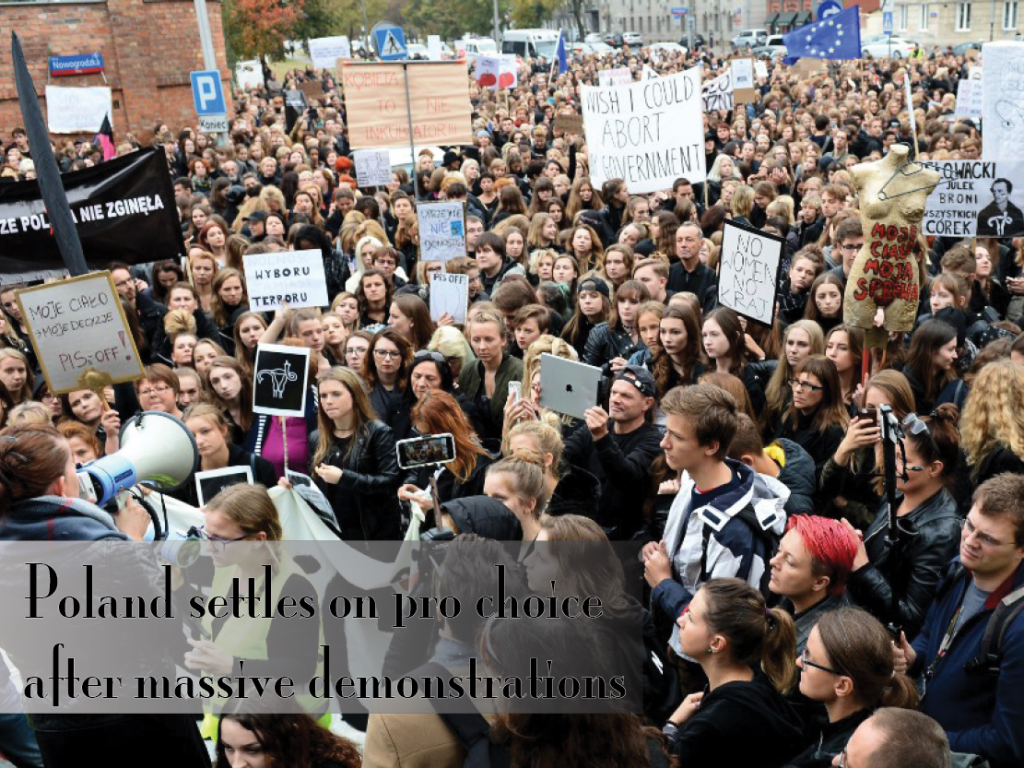“My body my choice,” ”No Jail for Abortion,” “We are not incubators to regulate.” Such were the slogans on signs held by masses of demonstrators protesting the abortion ban put forth by the Polish Parliament. According to the BBC, following these protests, during which nearly 100,000 people gathered in cities all around Poland, members of Parliament rejected the bill on Oct. 6 by a vote of 352 to 58.
The bill was to be an extension of already-existing Polish laws on abortion, which state that abortion is legal only if the pregnancy poses a threat to the mother, the fetus shows disabilities, or if the pregnancy was caused by rape. The bill, however, proposed to make abortions for pregnancies as a result of sexual assault illegal unconditionally, because it saw abortion as “punishing the child” for rape.
According to Romuald Debski, a doctor based in Warsaw, it would be illegal for a doctor to perform C-section on a pregnant woman suffering from preeclampsia—a pregnancy with high blood pressure, fluid retention, and proteinuria which could be fatal to both the mother and the child—if the baby were “premature.” Furthermore, critics saw the possibility that any women suffering from a miscarriage would be put under investigation by the police automatically, a situation which could lead to the indictment of innocent people.
“The debate on abortion is controversial in many countries around the world, with some leaning toward pro life and other leaning toward pro choice,” said Sunny Oh (11), former AP World History student. “I personally am pro-choice and find the Polish government’s decision to not only ban abortion but to require all babies to be birthed regardless of the mother’s or the child’s condition as inhumane. If the law had been passed many could have died while many more could have been thrown into jail for wanting to live.”
On Oct. 3, thousands of Polish women went on strike to protest against the proposed bill. Donning black garments, women from all across Poland—and even in other European cities like Belfast, Berlin, and Brussels—stood in solidarity. Anna Blus, a researcher at Amnesty International, noted that many women “held up coat hangers as a reminder of the primitive and dangerous methods of self-induced abortion women would be compelled to resort to.” Amnesty further criticized the proposed ban for being a backwards step for women in Poland.
“I sincerely believe that mass protests like the ones Polish women engaged in are essential to bring change in society,” said Brian Kong (12), History Honor Club member. “The thousands of voices that stood in union against the abortion laws were sufficient enough to convince the ruling party to go against their principles and repeal the bans. It really shows how if people rise up to express their grievances, genuine change can occur.”
For many Poles, sentiments against the proposed bills extends even further. The abortion ban was a part of a string of laws proposed and enacted by The Law and Justice party (abbreviated PiS in Polish), a conservative right-wing party which took power in Nov. 2015. PiS, whose driving policies has had influences from Euroscepticism and the Catholic Church, has been repeatedly criticized by the EU for limiting democracy in Poland; the party, upon taking power, quickly modified the Polish court system and put the media under governmental control, actions that the European Parliament condemned and the Guardian criticized for “endangering democracy.”
“Poland is currently governed by an extremely conservative and borderline non-secularistic government that infringes upon the democratic process,” said Sky Park (11), MUN member. “It is appalling to think that the government of a supposedly democratic country can be so authoritarian. Their seizure of Polish media and now this attempt to ban abortion based on Catholic beliefs is alarming. In some ways, Poland currently would be America if Donald Trump becomes president.”
The masses of protestors gave the Polish government “food for thought,” and the bill was eventually rejected by Parliament. Prime Minister Beata Szydlo rescinded her initial support for the bill and Deputy Prime Minister Jaroslaw Gowin stated that “Abortion will certainly not be banned when the woman is the victim of rape or if her life or her health is in danger.” It seems, then, the women of Poland have won.

